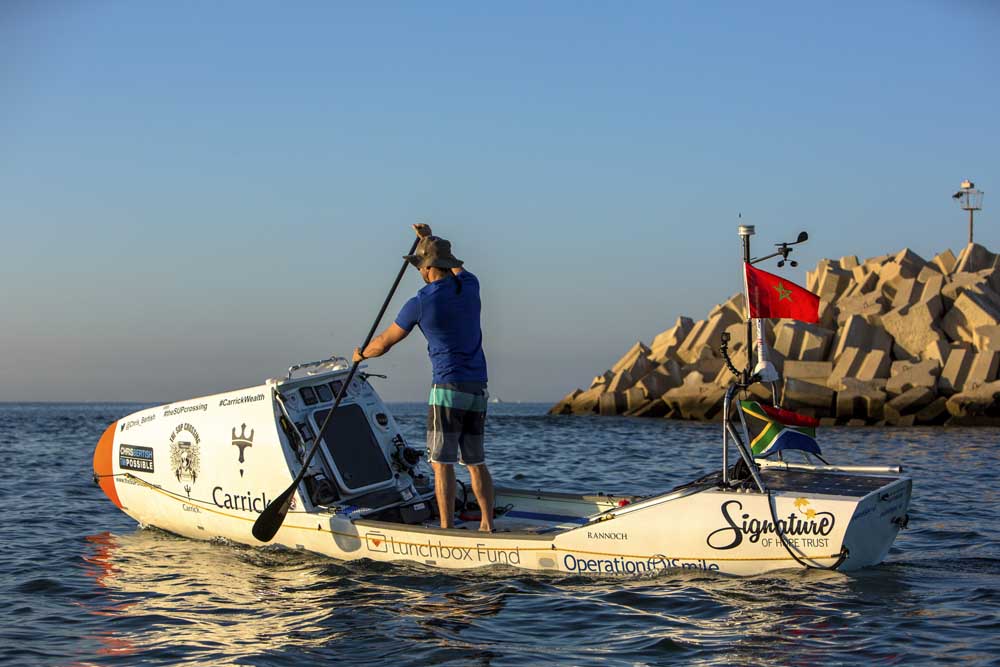Man sets off to cross Atlantic Ocean on stand-up paddleboard
Published 12:00 am Thursday, December 8, 2016

- Alan Van Gysen / The Sup Crossing via The New York TimesChris Bertish on his 20-foot custom-made stand-up paddleboard off the coast of Morocco. Bertish began his attempt to be the first person to cross the Atlantic Ocean on a stand-up paddle board on Tuesday.
Listening to the music of Johnny Clegg on speakers mounted to his custom-built craft, the South African Chris Bertish began his attempt to be the first person to cross the Atlantic Ocean on a stand-up paddleboard on Tuesday morning, gliding out of the Agadir Marina of Morocco, on the northwest coast of Africa, shortly before sunrise.
“I’ve been hearing that I’m nuts all my life, and I wouldn’t want it any other way,” Bertish said in a phone interview before he departed on the solo voyage. “I’ve been proving people wrong all of my life. But I’ve always wanted to push the boundaries because that’s where the magic happens.”
Bertish, 42, a sailor and big-wave surfer who won the renowned Mavericks surf contest in Northern California in 2010, plans to make the 4,600-mile, open-ocean passage unsupported and unassisted on a 20-foot stand-up paddleboard. He expects it to take four months.
The first five days, as he becomes accustomed to the paddleboard and fights to avoid being blown back to land, will be the hardest, he said — 90 percent of the challenge, in fact, by his estimate.
Once at sea, Bertish can expect to battle rough seas, sun exposure and tricky tides and currents, as well as unforeseen obstacles. He had been waiting weeks in Morocco for the perfect window of weather conditions to begin, and on Tuesday, he concluded that it had arrived.
Hoping to use the tides and weather conditions to his benefit, Bertish plans to paddle about 30 miles a day — mostly at night, to avoid exposure to the sun — for more than 120 days. On a typical day, Bertish said, he will alternate between resting and paddling every two or three hours. He will continuously hydrate and will nourish himself with protein shakes, freeze-dried meals with endurance additives, and salty jerky to replenish the electrolytes he will lose through sweating.
His expected route will take him to the Canary Islands, across the Atlantic Ocean to Anegada of the British Virgin Islands, and then finally to a finish in Florida.
If he makes it.
The last attempt to cross the Atlantic on a stand-up paddleboard, or SUP, did not end well. This year, Frenchman Nicolas Jarossay tried to make the crossing; one night a week into the trip, a rescue crew pulled him from the water. The crew found him clinging to his paddleboard, which had capsized.
“You have to be ready for difficult times and difficult storms that you’re going to get caught in,” Bertish said. “And that’s definitely going to happen.”
When storms hit, Bertish can take cover inside a cabin on his customized paddleboard and stabilize the vessel using anchors and drogues. The craft is also capable of righting itself after capsizing and submerging.
Designed for the crossing by Phil Morrison, a naval architect, the vessel took six months to build, at a cost of $120,000. It resembles a tubular rocket, marrying elements of trans-Atlantic rowboat craft and a standard SUP. A main cabin at the front of the craft helps the vessel right itself faster if it overturns and increases buoyancy. The aerodynamic profile deflects headwinds and provides easier control downwind, and a center plate helps Bertish remain on course.
“There’s nothing like it on the planet,” Bertish said.
Inside the watertight, coffinlike chamber of the cabin, Bertish is able to sit upright, with his head just barely brushing the roof. He can stretch out his 5-foot-7, 155-pound frame to rest, and all navigational and communications instruments are within arm’s reach.
Surrounding a small sleeping space are satellite weather forecasting equipment, logistics and routing services, stationary and hand-held VHF radios, satellite phone and tracking systems, several personal locator beacons and GPS systems, an autopilot system, water-storage bladders and two sets of solar panels to power all those electronics and batteries.
Bertish also has several GoPro cameras and a drone on board to document the trip on social media.
He has backups for all steering, navigational and communications systems, should they fail, as well as a satellite phone and a standard compass. If things really go bad, there is an emergency grab bag, flares and a life raft.
“The only way to achieve this is to be overprepared,” Bertish said. “If problems come up — and they will — you have to be ready for it. You have to be able to work through it.”
For example, he is traveling with four paddles. But he also took his guitar, and he is taking requests on Twitter.
There are no dedicated toilet facilities, however. “It’s all around the craft,” he said. “The ocean is a terrific sustainable toilet.”
Bertish’s musical catalog is made up of Eddie Vedder, Creed, INXS and Clegg, a South African, and he has eight recordings provided by his mental coach, which he will play at appropriate moments for encouragement.
“He has me breaking it down into bite-size chunks so I’m not looking at it as some insurmountable goal like looking up at Everest,” Bertish said. “I have mini-goals. Just one stroke at a time.”






